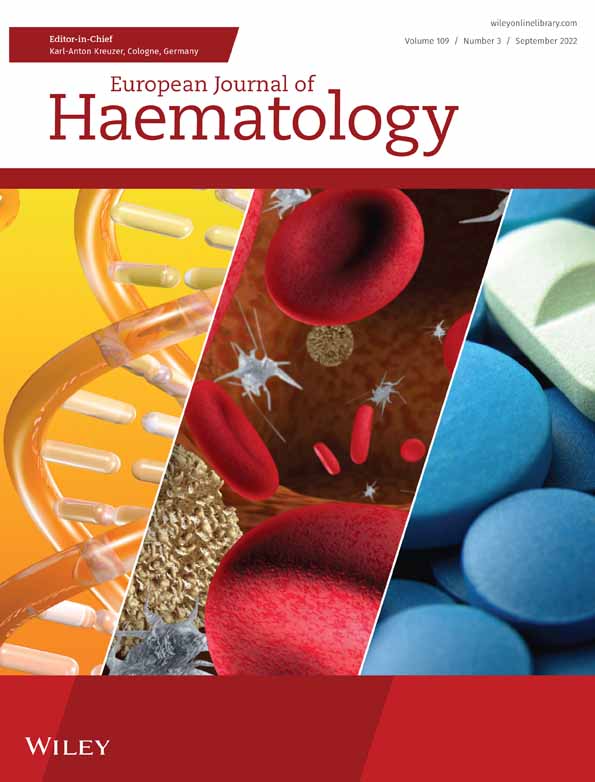Incidence of adult primary immune thrombocytopenia in England—An update
Drew Provan and Vickie McDonald are joint last authors.
Funding information: GlaxoSmithKline; Novartis
Abstract
Background
Adult primary immune thrombocytopenia (ITP) is a rare bleeding disorder of unknown cause. Recent estimates of its incidence and trend over time were acquired for England.
Method
The primary ITP population (using ICD 10 code D693 and excluding secondary ITP cases; positive predictive value: 82.6%) was sourced from NHS Digital inpatient and outpatient. Incidence rate (IR) for England and by age groups, sex, and regions were calculated and trends were assessed using average annual percent change (AAPC).
Results
A total of 25 805 patients (mean age 59 years; females 57.8%) diagnosed between 2003 and 2014 was identified. IRs increased from 4.2/100 000 to 6.4/100 000 over this period (AAPC:4.3%). For all sex-specific age groups, the IRs significantly increased over time, except 18–29 years males. The greatest increase was among females aged 30–39 (AAPC:8.7%). In contrast, among ≥70 years, ITP was more common in males (highest IR among ≥80 years males: 23.9/100 000). England's average annual IR was 6.1/100 000 for 2010–14. An estimated 2.5/100 000 (based on UKITP Registry data) was estimated to require 1st line treatment whereas 2.4/100 000 would have 1st and 2nd line treatments within 6 months from diagnosis. IRs for London and East Midlands were the highest (6.5/100 000).
Conclusions
This study found a rising incidence of primary ITP, with sharp increases among young women and elderly men. These findings put in context the impact of ITP on patients' lives and the healthcare services in England, especially with 17%–50% who may develop chronic ITP and require long-term care.
CONFLICT OF INTEREST
The United Kingdom Immune Thrombocytopenia is funded by various bodies including pharmaceutical companies. The sponsor for this study was GSK and then Novartis. The UKITP Registry has also received funds from Griffols and Rigal as well as Amgen in the past. In addition, it has received support from the ITP Support Association. The funders of the UKITP Registry had no input in the design, analysis and reporting of this study. Indraraj Umesh Doobaree—initiated and executed study at the Registry whereas reporting was pro bono work and was independent of Certara. Katherine Conway declares no conflict of interest with the subject matter in this manuscript. Nichola Cooper—honoraria: Amgen, Novartis, Griffols, Rigel, UCB, Sanofi, Principia, Sobi and research support: Rigel, Novartis. Charlotte Bradbury—speaker honoraria: BMS Pfizer, Bayer, Amgen, Novartis, Lilly, Janssen; advisory: Novartis, Lilly, Portola, Ablynx; support to attend conferences: Bayer, Amgen, Novartis. Michael Makris—honoraria: Grifols, Takeda and Sanofi. Quentin A. Hill—consultancy fees: Apellis, Argenx, Novartis, Grifols, Sanofi, ReAlta, Incyte, Immunovent, Janssen and Sobi and honoraria: Alexion, Apellis, Amgen, Grifols, Novartis. Adrian Newland—research funding, Speakers Bureau, Consultancy Amgen, Argenx, Grifols, BMS, Novartis, GSK, UCB Biosciences, Roche. Drew Provan—research support: Amgen, Novartis; self-employed; consultant: UCB, MedImmune, ONO, SOBI, Agenx; speaker's fees: Amgen, Novartis, SOBI, UCB; scientific advisory board: SOBI, UCB, Argenx; grant funding: Amgen, Novartis, Rigel. Vickie McDonald—speakers fees and advisory work Novartis, Amgen, Sobi, Abbvie; support to attend conferences: Amgen; research support: Grifols.
Open Research
DATA AVAILABILITY STATEMENT
All access to NHS data will require direct application to its Data Access Request Service, NHS Digital. With regards to UK ITP Registry data, all access enquiries should be addressed at [email protected].




